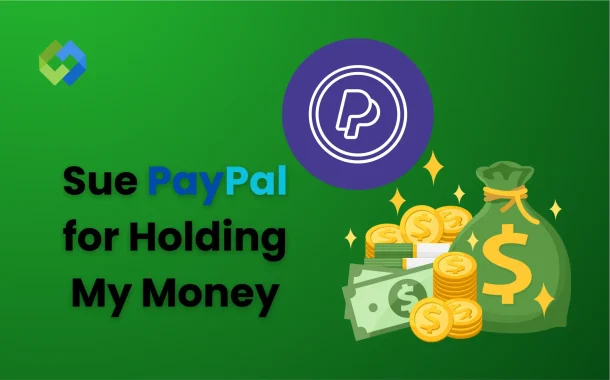Common scenarios for fund holds include selling high-risk items, getting a sudden increase in sales, or receiving payments from new buyers. PayPal might also hold funds if there is a dispute, refund request, or if your account has incomplete information. These holds are temporary and often resolved by providing the required documents or waiting a specific period.
Table of Contents
Table of Contents
Legal Rights and Consumer Protection
Your Legal Rights with PayPal
You have legal rights when using PayPal, as it must follow financial and consumer protection laws. These rights ensure that your money is safe and that PayPal handles transactions fairly. For example, PayPal must inform you of why your funds are held and for how long. They must also provide a process to resolve disputes and access customer support.
Consumer Protection Laws
Consumer protection laws vary by country but often include safeguards against unfair practices. If you feel your rights are violated, you can contact regulatory bodies like the Federal Trade Commission (FTC) in the U.S. or similar organizations in your region. Knowing your rights and PayPal’s policies can help you take the right steps to protect your money. Always review the user agreement and keep records of your transactions to address issues quickly.
Steps to Resolve Money-Holding Issues with PayPal
Contact PayPal Support
The first step is to reach out to PayPal’s customer support. Log in to your account and use the “Contact Us” option to explain your issue. Be clear and provide details about the payment, such as transaction IDs and dates. PayPal may ask for additional information to verify the transaction or your account.
Provide Required Documentation
If PayPal requests documents, submit them promptly. This could include proof of delivery, invoices, or identification documents. Providing accurate and complete information helps speed up the process.
Wait for Review Period
PayPal often reviews fund holds within a specific time frame. This can range from a few days to 21 days, depending on the case. During this time, ensure your account is in good standing and avoid any suspicious activities.
Follow Up Regularly
If the issue isn’t resolved within the expected time, follow up with PayPal. Use their messaging system or call customer support to check the status of your case. Persistent communication often helps in speeding up resolutions.
When to Consider Legal Action
If PayPal is holding your money without valid reasons or for an extended period, you may need to consider legal action. This step should come only after you’ve tried all other resolution methods, like contacting customer support and providing requested documentation. Legal action might be necessary when PayPal fails to give a clear explanation or release your funds even after repeated follow-ups.
Before proceeding, evaluate the costs and benefits of suing PayPal. Legal action can be expensive and time-consuming, so you should only pursue it if the amount held is significant. For smaller disputes, filing a case in small claims court is a simpler and more affordable option. If the amount involved is large, hiring an attorney to guide you through the legal process might be necessary.
You should also prepare by gathering evidence to support your case. This includes communication with PayPal, transaction details, and proof that you’ve fulfilled all their requirements. Solid evidence strengthens your claim and increases your chances of success in court.
How to Sue PayPal for Holding Your Money
Choose the Right Court
If the amount involved is small, small claims court is often the best option. It is simple, affordable, and doesn’t require a lawyer. Review PayPal’s user agreement beforehand to ensure your claim is valid under their terms.
Gather Evidence
Collect all necessary documents to support your case. This includes communication records with PayPal, transaction details, and any documents they requested. Having clear and organized evidence strengthens your claim.
File Your Claim
Submit the required paperwork to the court, along with a filing fee. Clearly outline your dispute, explaining why you believe PayPal is holding your funds unfairly. Provide specific details about the issue and any steps you’ve already taken to resolve it.
Consider Hiring an Attorney
For larger claims, an attorney can guide you through the legal process. They can help file the lawsuit, negotiate settlements, and represent you in court to ensure the best possible outcome.
Attend Court Hearings
Follow the court’s instructions and attend all hearings. Present your evidence clearly and focus on the financial impact caused by PayPal’s actions. If your claim is successful, you could get your funds released or receive compensation for damages.
Alternatives to Suing PayPal
Contact PayPal’s Support Team
Before considering legal action, reach out to PayPal’s customer support. Explain your issue clearly and provide all necessary details, such as transaction IDs and dates. Often, issues can be resolved by communicating directly with their team and submitting any requested documents, like proof of delivery or invoices.
File a Complaint with Regulatory Agencies
If PayPal’s support doesn’t help, you can file a formal complaint with financial regulatory agencies. In the U.S., you can contact the Consumer Financial Protection Bureau (CFPB) or the Better Business Bureau (BBB). These agencies can mediate between you and PayPal, often leading to a quicker resolution without needing to go to court.
Seek Mediation or Arbitration
PayPal’s user agreement may include a clause for mediation or arbitration. These are alternative dispute resolution methods where a neutral third party helps settle the issue. Mediation is less formal, while arbitration involves a binding decision. These options are faster and less costly than suing.
Use Social Media and Public Platforms
Another option is to share your issue on social media or review platforms. Publicly raising concerns often gets a quicker response from PayPal, as companies aim to maintain their reputation. Ensure your posts are factual and professional to gain constructive attention.
Conclusion
Suing PayPal to hold your money is possible, but it should be your last option. Before taking legal action, explore other solutions like contacting their support team, filing complaints with regulatory agencies, or trying mediation. These steps can often resolve the issue faster and with less stress.
If legal action is necessary, be prepared with strong evidence and a clear understanding of the process. Small claims court can be a simpler option for smaller disputes. Always weigh the costs and time involved before proceeding.














